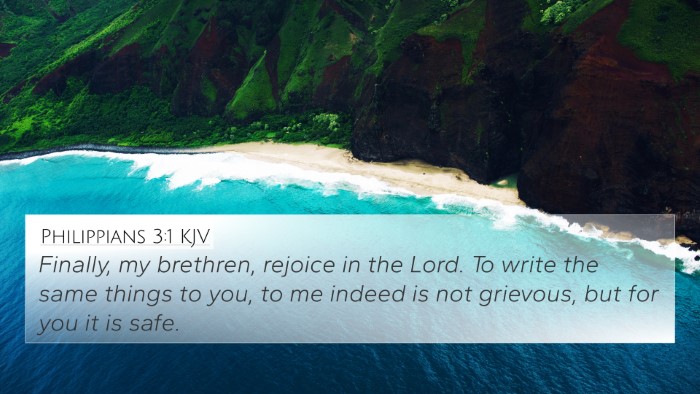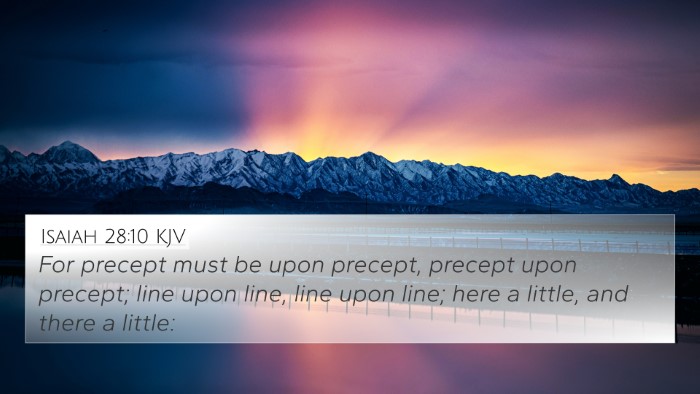Old Testament
Genesis Exodus Leviticus Numbers Deuteronomy Joshua Judges Ruth 1 Samuel 2 Samuel 1 Kings 2 Kings 1 Chronicles 2 Chronicles Ezra Nehemiah Esther Job Psalms Proverbs Ecclesiastes Song of Solomon Isaiah Jeremiah Lamentations Ezekiel Daniel Hosea Joel Amos Obadiah Jonah Micah Nahum Habakkuk Zephaniah Haggai Zechariah MalachiHaggai 1:7 Similar Verses
Haggai 1:7 Cross References
Thus saith the LORD of hosts; Consider your ways.
Uncover the Rich Themes and Topics of This Bible Verse
Listed below are the Bible themes associated with Haggai 1:7. We invite you to explore each theme to gain deeper insights into the Scriptures.
Haggai 1:7 Cross Reference Verses
This section features a detailed cross-reference designed to enrich your understanding of the Scriptures. Below, you will find carefully selected verses that echo the themes and teachings related to Haggai 1:7 KJV. Click on any image to explore detailed analyses of related Bible verses and uncover deeper theological insights.

Philippians 3:1 (KJV) »
Finally, my brethren, rejoice in the Lord. To write the same things to you, to me indeed is not grievous, but for you it is safe.

Isaiah 28:10 (KJV) »
For precept must be upon precept, precept upon precept; line upon line, line upon line; here a little, and there a little:
Haggai 1:7 Verse Analysis and Similar Verses
Understanding Haggai 1:7
Verse: Haggai 1:7 - "Thus says the Lord of hosts: Consider your ways."
Summary of Meaning
The verse Haggai 1:7 is a call for self-reflection and introspection. God, through the prophet Haggai, urges the people of Israel to examine their actions and priorities, especially in the context of their decision to neglect the rebuilding of the temple. Here, the Lord emphasizes the importance of reflecting on one’s ways as a pathway to restoration and understanding God’s will.
Insights from Commentaries
-
Matthew Henry:
Henry explains that the call to "consider your ways" implies a necessary self-examination regarding the people's priorities. He stresses that God's people, despite having returned from exile, were more focused on their own homes than on restoring the temple of the Lord, which represented their covenant relationship with God.
-
Albert Barnes:
Barnes notes that the phrase "consider your ways" is a profound invitation to recognize the consequences of their neglect. He suggests that God’s command is designed to awaken the people to their spiritual failures and prompt them towards repentance and action concerning their priorities in worship and service to God.
-
Adam Clarke:
Clarke sees this verse as a moment for the Israelites to reflect on their disobedience and to realign themselves with God's purpose. His commentary emphasizes the urgency of changing their ways to fulfill their duty to God, shedding light on their need to focus on spiritual priorities over material concerns.
Bible Verse Cross-References
Here are some related Bible verses that connect with Haggai 1:7:
- Proverbs 4:26: "Ponder the path of your feet, and let all your ways be established." - Encouraging self-reflection regarding the paths we choose.
- Galatians 6:4: "But let each one examine his own work, and then he will have rejoicing in himself alone, and not in another." - This reinforces the need for personal self-assessment.
- James 1:22: "But be doers of the word, and not hearers only, deceiving yourselves." - Highlights the importance of acting on the understanding that comes from self-reflection.
- Matthew 7:3: "And why do you look at the speck in your brother's eye, but do not consider the plank in your own eye?" - A call to self-examination before judging others.
- Isaiah 55:7: "Let the wicked forsake his way, and the unrighteous man his thoughts; let him return to the Lord, and He will have mercy on him." - An invitation to turn toward God after recognizing one's errors.
- 2 Corinthians 13:5: "Examine yourselves, whether you be in the faith; prove your own selves..." - Encourages believers to assess their faith and spiritual standing.
- Psalms 139:23-24: "Search me, O God, and know my heart; try me, and know my thoughts..." - A plea for introspection and divine guidance.
Thematic Connections and Cross-Referencing
This verse encapsulates critical themes in the Bible, reflecting God’s call for His people to assess their spiritual priorities. The following connections can be drawn:
- Spiritual Priorities: The neglect of the temple mirrors modern-day distractions that can lead believers away from focusing on God’s work.
- Repentance: The concept of self-examination is central in both Haggai's time and the teachings of Christ and the apostles.
- God’s Mercy: The invitation to consider one’s ways is always coupled with the opportunity for repentance and receiving God’s mercy (as seen in Isaiah 55:7).
Conclusion
Haggai 1:7 serves as a powerful reminder of the importance of self-examination and prioritizing one's relationship with God. The connections between this verse and others within Scripture offer a deeper understanding of the necessity to reflect on one’s ways and make adjustments in life to align with God’s desires. Through inter-Biblical dialogue, believers can find a cohesive narrative that encourages active engagement in their faith journey.




